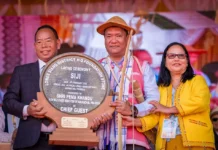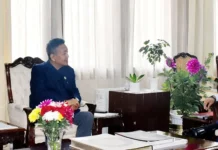Flights Of Fantasy
[ M Panging Pao ]
Many Arunachalee old-timers recall the 1962 Sino-India conflict with fear and anger. The Chinese forces entered deep into Arunachal Pradesh along many axes like Taksing-Limeking, Mechukha/Manigong-Tato, Gelling-Tuting, Kibithoo-Walong axes and the main Tawang-Bomdila-Rupa axis. Many readers are not aware of fierce battles fought by our brave soldiers. One such story is the story of Rifleman Purna Bahadur Tamang.
Just 28 years old, young Rifleman Purna Bahadur Tamang hailed from Lebung village in Darjeeling, West Bengal. He belonged to the 2 Assam Rifles and his unit was deployed north of Tawang in Arunachal Pradesh during the Sino-India war of 1962.
The Sino-India war started on 20 October, 1962, with a massive multi-frontal, multi-directional attack by Chinese forces, including on the positions held by Rifleman Purna Bahadur Tamang’s unit. Rifleman Purna Bahadur Tamang’s unit fought back and beat back the initial Chinese waves of attacks. However, the Chinese forces attacked with additional forces and transgressed rapidly into Indian territory.
On 22 October, 1962, after a critical ridge had fallen to the Chinese forces, it became difficult for their platoon post to withdraw as the Chinese had occupied the high grounds surrounding their post. To add to their troubles, their post’s wireless radio set had also gone out of order. It was not possible to communicate and relay any messages to other units in their vicinity. In these adverse conditions, Rifleman Purna Bahadur Tamang volunteered to carry a message from his commanding officer to the commander of the nearby post. Despite being surrounded by enemy forces and facing the gauntlet of heavy enemy fire, he made his way through the tough mountainous terrain, successfully avoiding the enemy forces, and managed to deliver the message to the nearby post commander. The whole process took about five hours. Delivery of the important message by him enabled the platoon to extricate safely and save the lives of the 40 soldiers of his unit.
Throughout the entire battle, Rifleman Purna Bahadur Tamang displayed the highest sense of duty, leadership and courage in the best traditions of the Army. For his exceptional courage, tenacity and gallantry during the war, Rifleman Purna Bahadur Tamang was awarded the third highest gallantry award of the nation, Vir Chakra, posthumously. Salute to Rifleman Purna Bahadur Tamang! (The contributor is retired Group Captain, Indian Air Force)



